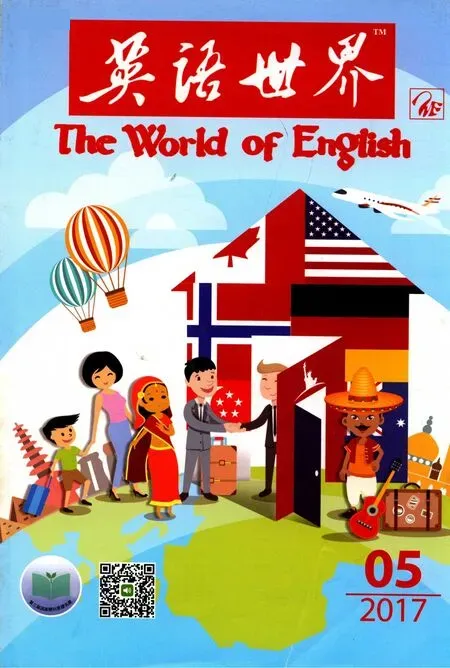在中国,谁是“旅居人士”,谁是“移民”?
文/约翰·尼兰德 译/钟灵毓秀 审校/屈文生
在中国,谁是“旅居人士”,谁是“移民”?
文/约翰·尼兰德 译/钟灵毓秀 审校/屈文生
People from all over the world continue to flood into China’s big cities like Hong Kong, Beijing and Shanghai to make a living. They often have much in common; leaving family and friends behind and being exposed to a new puzzling culture. But there’s one thing that separates them.
[2] Often, people from the U.S. and Europe are defined as expatriates, or“expats1expat 旅居人士,有时也翻译为“侨民”或“外派人员”。,” while those coming from,say, Somalia or Pakistan, are branded as“immigrants.”
[3] Why is that, and what’s actually the difference, if any?
[4] According to the Merriam-Webster dictionary,expatriatemeans someone “living in a foreign land,”while the de fi nition ofimmigrantis “a person who comes to a country to take up permanent residence.”
[5] But lately, there’s been a debate about the terminology2terminology有特别含义的用语。with some saying the de fi nitions are outdated and today more symbolize privilege, race and socioeconomic status.
[6] Mawuna Remarque Koutonin,who runs SiliconAfrica, recently wrote in theGuardianthat it’s evidence that“in the lexicon3lexicon(某一学科、个人或群体的)全部词汇。of human migration,there are still hierarchical words,created with the purpose of putting white people above everyone else.” He quoted an African migrant worker living in Europe: “I work for multinational organizations both in the private and public sectors. And being black or colored doesn’t gain me the term expat.I’m a highly qualified immigrant, as they call me, to be politically correct.”
[7] So what’s the situation like in Hong Kong and Mainland China?
[8] Holing Yip, research of fi cer of the Hong Kong Unison, an organization that advocates policy reforms to bene fi t disadvantaged ethnic minority residents,said the distinction between “expat”and “immigrant” cements4cement巩固,强化。an already destructive segregation between people.
[9] “There’s been quite a lot of buzz about these words recently and different people have different definitions. I definitely agree with the declaration that the word ‘expat’ is related to privilege. But what’s interesting is that it’s a perceived5perceive察觉。privilege—what I think when I meet or see someone; how I treat them. It’s often aligned with6align with与……一致。race and socioeconomic status.”
[10] Schools, in particular, play host to racial segregation between local,expat and immigrant children, she said,with many schools being like parallel universes.
[11] As a professional expat in Hong Kong, you may be granted permanent residency with full rights and protections after seven years.But for those hundreds of thousands of Filipino and Indonesian domestic helpers that take care of the city’s babies and scrub the bathroom floors, permanent residency is often merely a dream. Some locals fear that granting foreign domestic helpers, and their families, permanent residency would overwhelm the public systems.
[12] The expat vs. immigrant phenomena can be seen in many of those Chinese cities that attract workers and professionals from the international community. Typically,websites focusing on expats in Beijing or Shanghai display photos of white,smiley families.
[13] InterNations7全球最大旅外人士交流平台,230万会员分享在全球390个城市的工作和生活经验。, the world’s largest network for people who live abroad, has almost 50,000 members in Mainland China, with most of them in Shanghai,Beijing and Guangzhou. Its mission is to “make life easier for expats.”
[14] The organization’s co-founder Malte Zeeck has noticed that members there were more likely to brand themselves as “expats” than members in Europe.
[15] An InterNations survey also showed that expats in Mainland China are less likely to befriend8befriend友善相待。locals than in most other countries, possibly due to“the culture gap between expats and the local culture.”
[16] Not all agree it’s a question of race. In aWall Street Journalblog,journalist and “global nomad9nomad流浪汉。” Ruchika Tulshyan added more nuances10nuance(意义、声音、颜色、感情等方面的)细微差别。to the term than just rich-white-personmoving-abroad-with-no-desire-tointegrate. “Today’s expats are from all over the world, from diverse backgrounds and with different skin colors, most with a desire to integrate within the new society they have joined,” she said.
[17] Warsaw based American journalist Andrew Kureth offers an alternative de fi nition: “An immigrant is on a desperate search for a better life.An expat is on an adventure.”
[18] However you look at it, the term expat is under fi re. ■
世界各地的人们持续涌入中国,来到香港、北京和上海等大城市谋生活。这些人身上通常有不少共同点:他们离开家人朋友,置身于一个新奇的、令其困惑的文化之中。但有一点将他们区分开来。
[2]来自美国或欧洲的人通常被称为“旅居人士”(expat),而来自比方说索马里或巴基斯坦的人却被归为“移民”(immigrant)。
[3]为什么会这样?如果两者间存在区别,区别到底是什么?
[4]根据韦氏词典的定义,expatriate是指“生活在他国的”人,而immigrant是“迁往一个国家永久定居的人”。
[5]但最近,围绕这一用语出现了争议。一些人认为,上述定义早已过时。事到如今,这样的区分更像是在显示两个群体间在特权、种族和社会经济地位等方面的差异。
[6]硅谷非洲网站负责人马武纳·雷马克·科托宁近日在《卫报》中写道,这证明了“在人类迁居的词汇中仍保留有表示等级关系的词汇,而创造它们的目的就是为了显示白人至上”。他引用了一位生活在欧洲的非洲籍外侨工人的话:“我就职的跨国企业既有私营的,也有公有的,但我的黑皮肤或者说有色皮肤无法让我获得旅居人士的称呼。出于政治正确,人们称我为高素质移民。”
[7]那么,在中国香港和中国内地是什么样的情况呢?
[8]香港的融乐会致力于推动政策改革,以使弱势少数族裔居民受益,该组织的研究员叶皓羚认为,“旅居人士”和“移民”的区分强化了破坏性的民族隔离态势。
[9]“最近关于这些词汇有许多争论,不同的人给出了不同的定义。我完全同意expat一词与特权相关的说法。但有趣的是,这种特权是能被真切地感受到的,比如当我遇见或打量不同外国人时会自然而然产生不同的想法,或是用不同方式对待他们。这往往与种族和社会经济地位相一致。”
[10]她认为,本地人、旅居人士和移民的孩子三者之间的种族隔离现象在学校中尤其突出,许多学校彼此间并无交集。
[11]有一技之长的旅居人士在香港工作满七年后可获得永久居留权,并享有充分权利和保障。但对于那些成千上万来自菲律宾和印尼的家庭佣工来说,他们虽悉心照料这个城市的新生儿,擦洗浴室地板,永久居留权却遥不可及。一些当地民众担心给予外籍家庭佣工及其家人永久居留权会使公共系统不堪重负。
[12]旅居者与移民抗衡的现象出现在中国的很多城市,这些城市吸引了来自世界各地的普通劳动者和和专业人士。通常来说,北京或上海旅居人士网站上展示的往往是白人家庭幸福笑脸的照片。
[13]全球最大的旅外人士网站InterNations有近5万名侨居中国大陆的会员,其中大部分在上海、北京和广州。该网站的宗旨是“让旅居人士的生活更轻松”。
[14]该组织的联合创始人马尔特·齐克注意到,比起欧洲的会员,在中国生活的会员更倾向于把自己称为“旅居人士”。
[15] InterNations网站的一项调查显示,可能由于“本国文化与中国文化之间的巨大差异”,中国大陆的旅居人士与其他国家的旅居人士相比,更不易亲近当地人。
[16]然而,不是所有人都认同这是一个种族问题。名为“世界流浪者”的记者鲁奇卡·图珊在《华尔街日报》的一篇博文中,给这个词增添了一些新的含义,认为它不仅仅代表着“移居国外但不愿融入的富裕白人”。她说:“今天的旅居人士来自世界各地,有着多元化背景和不同肤色。他们中大部分都已加入一个新社会,渴望能够真正融入其中。”
[17]美国驻华沙记者安德鲁·库雷斯给出了另一种定义:“移民渴求更美好的生活,而旅居人士是在经历一场奇遇。”
[18]无论你如何看待此现象,expat一词正饱受争议。□
In China, Who Is an Expat and Who Is an Immigrant?
ByJohan Nylander
(译者单位:华东政法大学外语学院)

